This is a nightmare scenario for any pool owner. Someone’s chicken nuggets don’t agree with him/her and before know it, you have Code Brown on your hands. And if it is your pool, it comes down to you to clean it up. Because fecal matter in a pool poses a health risk due to exposure to bacteria and parasites, you need to operate with a clear mind in such murky times. In this article, we’ll show you exactly how to rid your pool of the brown menace, both solid and not so solid.
But generally what is the best action when you have fecal matter in the pool?
Quick answer: Shock the crap out of it.
Well, yes. Shocking the water is the best way to sterilize your water, short of draining the pool entirely. Another important factor is time. The pool must be kept at shock levels for certain periods of time depending on the type of fecal matter in the pool.

Why Is a Poopy Pool Bad?
Besides the obvious fact that no one wants to swim in a toilet, Accidental Fecal Releases (AFRs) introduce a wide range of germs to your pool. The most well-known and dangerous to swimmers are Giardia and Cryptosporidium parasites.
Giardia
Giardia is a parasite that causes extreme diarrhea, cramping, bloating and fatigue. Sufferers would compare a Giardia infection as similar to food poisoning, except it can last for six to eight weeks.
Some people who carry this parasite may never present signs of the infection, but still pose a risk to infect others via contact with their stool.
Cryptosporidium (Crypto)
Cryptosporidium also presents symptoms similar to Giardia, but add in a severe cough and fever. Symptoms of Crypto can last one to two weeks, but can last longer in serious cases.
Both of these parasites are bad news. So, here are the ways to purge your pool of all these nasties without draining your water.

How to Clean Solid Fecal Matter From Your Pool
Not that I would ever wish poop to be in your pool, but if it were to be in there you would want the solid kind. Due to its makeup, this material clumps together, lessening the infection zone. For the most part you can remove it from your pool and then run through a normal shock cycle.
Step 1: Close your pool immediately. To lessen the chance of infection, get all swimmers out of the pool and remove all the toys and floats.
Step 2: Remove as much of the fecal matter as possible. The preferred method is a net and bucket. DO NOT VACUUM THE FECAL MATTER.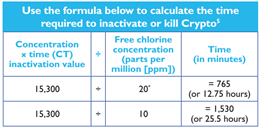
Step 3: Shock your pool with sodium hypochlorite. Raise your free chlorine (FC) level by at least 2 parts per million. Hold your chlorine level at this shock level for 25-30 minutes. If your shock level varies from the 2 ppm recommended dose, review the chart.
How to Clean Diarrhea in Your Pool
The process of cleaning diarrhea is more intense because of the fluid nature of the material. Because it is liquid, the stool will begin to mix with the pool water immediately, widening the infected area. The cleaning process goes from minutes for solid material to hours for diarrhea. The shock needs to have time to seek out all nasty things in your water, and then destroy them.
Step 1: Close the pool immediately. Remove swimmers from the pool and have them wash as soon as possible.
Step 2: Remove as much of the solid portions of the stool as possible. VACCUMING THE FECAL MATTER IS NOT RECOMMENDED.
Step 3: To make sure your shock is working at full efficiency, you need your pool’s cyanuric acid (CYA), also known as stabilizer, to be between 1-15 ppm. Test your water. For CYA levels above our necessary dose, drain your pool of the percentage between your pool’s CYA levels and 15 ppm. Then refill with fresh water.
For example: If your pool’s CYA level is 50 ppm, the equation would go as so.
50 ➗ 15 = .3 or 30%
You would need to drain 70% of your pool water.
Anything more than that 70 percent, you’ll probably just want to drain the pool completely and start from scratch. Test your pool water’s cyanuric acid level.
Step 4: Hyperchlorinate your pool by adding pool shock and maintain this shock level for an extended period of time. Using sodium hypochlorite (pool shock) you will need to hyperchlorinate your pool for an extended period of time to ensure your pool is free of harmful parasites and bacteria. Follow the chart provided by the CDC.
Step 5: Backwash the filter thoroughly and replace filter media if necessary, e.g. filter cartridges, sand, DE powder and grids. Sometimes even the hyperchlorination can’t get your filter media clean, so it is best to start anew to prevent a flare up of bacteria down the line.
Well, that just about covers it. If you have any ideas about how to clean your pool, or possibly even a story, leave a comment down below.

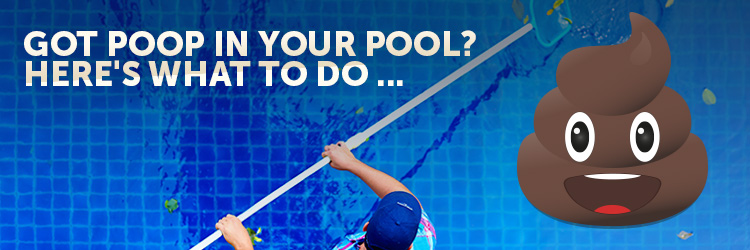

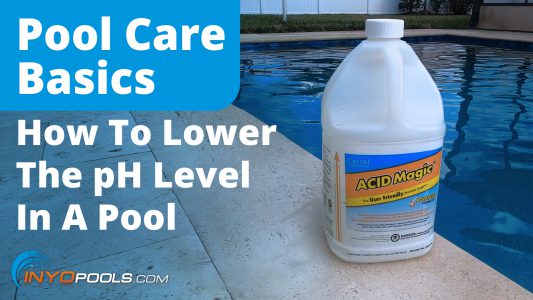
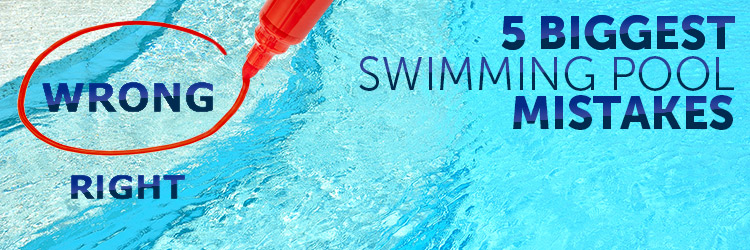
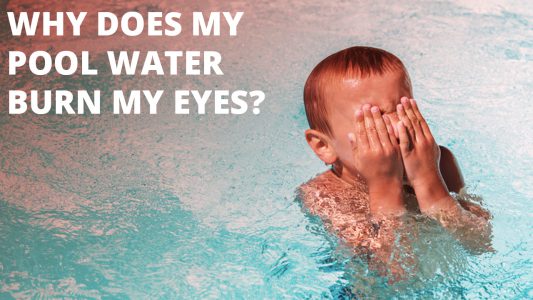






Drain the pool. Watch the movie CaddyShack for further detail.
So once I’ve shocked it after the brown menace, is there a way to bring the chlorine levels back down to swimmable levels?
The chlorine level will eventually drop to safe levels, it may take up to a day or two.
Thank you
This happened to us last night. My granddaughter, 3 years old pooped in her pants and didn’t tell anyone…it was a runny stool. Who knows how long it was in her swim diaper….hope all the other kids don’t get sick. As soon as we found out, we made everyone get out. But, who knows how long she swam with it in her diaper…so scared!
Children who are still in diapers need there own little pool. Keep them out of a pool where other people swim!
I went to an official Aquatic Therapy course for physiotherapists. They used official UK pool management recommendation for hydrotherapy pools and … told us – if somebody pucked or poo-d in your pool you should take conventional micro test (bags grow in media, result in 7 days!) and just carry on, because chlorine kills all harmful bacteria. Yet in just few pages away in thier presentation there was a list of pathogens not killed by chlorine.
Procedure in the hydro pool we own – take screening micro test with result in 5 min, if positive, do two more repeat tests. If two of three positive – CLOSE THE POOL and send to micro lab for final microbiological identification. If one of nasty pathogens found – drain the water.
That MEDIC who run the course (if you can call physio medics) told me WE ARE WRONG. Because she got no idea screening micro tests even exists. I am a pharmacist by degree and worked as analytical chemist when went to research after uni. Why people who got no idea of science behind the issue write official industry standards I do not know. But I personally cannot bend to 2+2=5 even under that type of preasure.
For a personal use pools – you need to watch health status of the human who had accudent. If they are healthy – nothing to worry. But unknown animal poo – if a lot of chrlorine your only mediating strategy, you may place your kids in danger of a nasty infection.
I have a question for you.
We operate commercial pools and have AFR’s monthly.
When does fecal cross the line between Formed and Diarrhea? We’ll get AFR’s that are like raisinettes or rabbit turds and go everywhere. While they are “solid” they are not one or two large clumps. What’s your opinion on handling it?
What do you do when a toddler poops in your 12×16 semi inground salt water pool?
Good question and I suggest giving the article a read as we cover what to do when dealing with the different types of fecal matter.
Good luck! 🙂
sell it. it’s not a real pool anyway
Can you shock a salt water pool?
Yes, you can.
Today I learned about poop. In a pool. And how to clean it. (A succession of things strange and unusual) Never had so many laughs reading an article and the comments. Best thing ever!
💩💩💩😈😂😂😀😁😁
So my 11 month old niece had a swim diaper on and was in my pool . I never noticed any fecal matter while we were in the pool but when we got out I took her swim diaper off and there was poop in it ( obviously she pooped while we were in the pool) and it was kind of smeared all over the inside of the diaper, not in one clump. Should I just assume some of it got in the pool and shock it?
Yes, that is a very astute assumption. I suggest shocking the pool to be on the safe side.
Absolutely, yes, shock the pool! What you have there is akin to a poop tea bag. LOL
Help 2 yr old grandson had diarrhea in the pool tonight came out of his swim diaper. It is just a small 14 ft round above ground but cant afford to drain and run water pump again it is well water off our electricity bill. What can I do?
The whole article talks about shocking the pool to kill the bacteria. The article couldn’t be more straight forward.
Reading is hard. 🥴
I dumped half a jug of bleach in my pool same size to raise the “free chlorine levels” let the pump run all night..
Mantain high chlorine level and low. Stabilizer over night.. Chlorine (bleach ) with no stablizer gets to work right away and is not held captive by stablizer.. After 24 hours check levels if ph is too high you can use baking soda (it also clears the water of any cloudy look)
After 24 hours you can adjust levels back to normal. ( this advice is for small kiddy pools 10ft wide or smaller..
I came home and there was cheap in my pool in the step.. If I If it was human or a animal like a bobcat or something. I have a vinyl pool so it can’t be drained and chemicals are a problem too..what do I do..and
how do I know if it was human or not.
might be a frog. Look it up on YouTube. Would have never thought they could produce a turd so big.
I guess if you really wanted to know, you could get it tested somewhere. But, poop is poop; it carries bacteria and no one wants to go swimming in a toilet.
Bite the bullet, shock your pool.
Happened to me last summer: Crash zoom to the poop – sounds of screeching violins from Psycho… turned out to be a sausage that rolled off the BBQ!
Love this story, and the stage direction! 🙂
Fuck….. had a step daughter do this tonight…. not a happy camper! Definitely a shitty situation
Lol happened to us tonight. Lucky just a small turd and caught it right away. I have the super chlorinate cranked up to high:)
language
Find new friends that don’t drink and get bombed so much.
my friend pooped in my kids pool
That’s a crappy thing to do.
….I’ll see myself out.